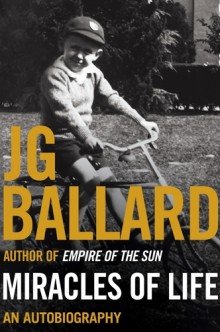Having just completed Francis Wheen’s ‘Strange Days Indeed’ a superb detail of the paranoia of the 1970’s and its orchestration of the following forty years and beyond I reached back to the pile of texts waiting to be devoured. I pulled down ‘Miracles of Life’ not knowing what to expect but persuaded by the exuberant reviews littered across the inside page. My closest experience of Ballard before now had been David Cronenberg’s 1996 film adaptation of ‘Crash’ and so I entered relative virgin territory with some anticipation. Now you know when you don’t particularly look forward to something and it turns out to be an extremely pleasant surprise? Well this was one of them. Consumed in three sittings and over two days it was enlightening and honest.
Born in Shanghai in 1930, the first part of the book reveals a pre war Chinese urbanism not unlike the present day. Extreme affluence and absolute disadvantage hand in hand at different ends of the same street. Both the result of unfettered capitalism. The difference being is that the China of the 1930’s was about to be transformed by state oppression and now it is attempting to shake of some of the misguided totalitarianism but doesn’t know how to. Ballard as a child lived in a house with Chinese servants and low on tactile parents. The old middle class Englishness is not lost upon Ballard as he seeks to escape in to his own adventures. In a city that is on the verge of being consumed bit by bit by Japanese soldiers that eventually led to his internment in a prison camp on the edge of the city sprawl the future author surprisingly enjoys some of the best days of his life. As a child, Ballard makes it clear that imprisonment, under the fairly relaxed regime of camp commander Hyeshi is an entirely different experience for a child than an adult. For the adults it was all chores and boredom but for the children is was education and nonstop investigation. The camp became all he knew for two years. Then the message came through that the US had exploded atomic bombs on Hiroshima and Nagasaki and the Japanese guards disappeared almost overnight. In a short time Ballard found himself sailing to England for the first time and here he would remain for the rest of his life.
Post war England was an interminable disappointment. Riddled with class delineations and artificial social mores, Ballard could only see grey clouds and inglorious victory. Not until the mid 1960’s did he consider that the country began to wake up. This he concluded, was due largely to the import of Americanism in the shape of commercialisation. With it came ideas, technology and a sense of freedom that up until then was locked away in snobbery and aloofness. The death of Kennedy and the guilt over the fall of King Arthur’s court he cited as the catalyst. As a republican and an atheist Ballard considered that there was intellectual hope after all.
On a personal level Ballard experienced tragedy just as he seemed to be settled for the first time. Having become a father of a son and two daughters his wife Mary suddenly died having contracted an infection and then pneumonia. He then took on the responsibilities of fatherhood and it became the centre point of his life. Mary had been a strong supporter of his desire to become a writer and it was this influence as well as his future partner Claire Walsh and close friends such as Kingsley Amis and Chris Evans that enabled him to mix domestic responsibities with becoming the writer that made his fame. Unlike many writers however, his path had begun at medical school at Cambridge where he initially set upon becoming a psychiatrist. However, at the time he had no choice but to study medicine as there was no discrete school for psychology. This though would have a profound effect enabling a forensic approach to storytelling and novel construction that few before or after have prepared for. His renowned novels for example Crash; Empire of the Sun and Cocaine Nights all bear the marks of his science background not to mention the surrealist influences and an existential perspective. There is also no doubt that as the book draws to a close with the names of Iain Sinclair and Will Self prominent that he has been an inspiration to others just as they became an inspiration to him.
If you want to see England eternally differently and to have the bulb brightened you will do yourself a considerable favour by reading this autobiography and like me his other work. And if you know little about China and the influence of life upon a writing career this should be a first stop. Like Christopher Hitchens after him, Ballard used the time he had left after a cancer diagnosis to achieve one of his best works and we should all be grateful.
Douglas James







